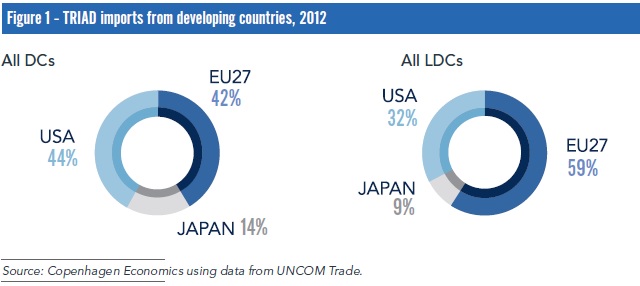News
New study: Assessment of economic benefits generated by the EU trade regimes towards the developing countries

It is a well-known fact that EU trade policy is a significant tool for development policy. Indeed, the EU has a long tradition of granting preferential access into its market for exports from developing countries. Ultimately, an increase in the exports of developing countries should result in a stimulus to their global economic activity and development.
However, it is not unusual to hear criticism of EU trade policy vis-à-vis the developing countries – calling into question its effectiveness in fully respecting the principle of policy coherence for development.
A major new study assessing the true economic benefits generated by the EU trade regimes towards developing countries has recently been carried out. The study report was publicly launched on 6 July 2015 by European Commissioner for International Cooperation and Development Neven Mimica and DG DEVCO Director General Fernando Frutuoso De Melo.
The study demonstrates that EU trade policy has had a positive impact in terms of policy coherence for development. Using advanced econometric techniques and large databases the study also leaves no doubt that trade preferences – such as the Generalised Scheme of Preferences (GSP) initiative – granted by the EU have significantly increased the exports and the economic diversification of developing countries and in particular of the Least Developed Countries (LDCs).
Another interesting result from the study is that the full impact of preferences on exports has arisen within two years after the preferences were granted. Finally, the study also indicates that in part these exports had a measurable positive effect on poverty reduction.
Scope of the Study
Part I of Volume I provides a descriptive analysis of the evolution of exports from developing countries to the EU over the last 40 years across trade regimes, regions and sectors as well as a descriptive analysis of FDI flows.
Parts II and III of Volume I apply a new and advanced micro-econometric technique to an extremely large data set of more than 12 million observations, containing detailed tariff information at the 6-digit product-level, to measure the causal impact of preferences on the export’s growth and on the number of products exported by developing countries to the EU over the period 1995-2012. To the best of our knowledge, this is the first time ever that an analysis of this kind has been done in the EU context.
Finally, Volume II assesses empirically the impacts of exports on poverty reduction in developing countries, based also on an econometric analysis. Volume II is presented separately from Volume I.
Key Results
The EU is, by far, the largest market for imports from the LDCs
In 2012, the EU27, USA and Japan (jointly referred to as the TRIAD), imported goods worth more than €2.000 billion from developing countries. Thereof, the EU27 alone imported goods worth €860 billion, equivalent to 42% of all goods imported into the TRIAD. And the EU is, by far, the largest market for imports from the Least Developed Countries to the TRIAD (almost 60% of the LDCs total exports).

Over time, EU imports from developing countries have grown steadily. The introduction of EBA and GSP+ had a visible impact on the growth of imports of the group of countries under these schemes.
EU trade policy increased the exports and the economic diversification of developing countries and LDCs
The econometrics results are highly robust and leave no doubt that GSP preferences have significantly increased the exports and the economic diversification of Developing Countries and Least Developed Countries to the EU over the period 1995-2012.
Exports have a significant impact on poverty outcomes but only if combined with appropriated domestic policies
While the results are somewhat less robust than those presented above, the econometric analysis suggests that exports when combined with other policies (for instance, better access to credit for domestic producers) had a significant impact on poverty reduction in developing countries.




